READY TO GET STARTED?
REQUEST A FREE ESTIMATE
Fill out the form below or call (888) 466-7849 for a free, no-obligation estimate.
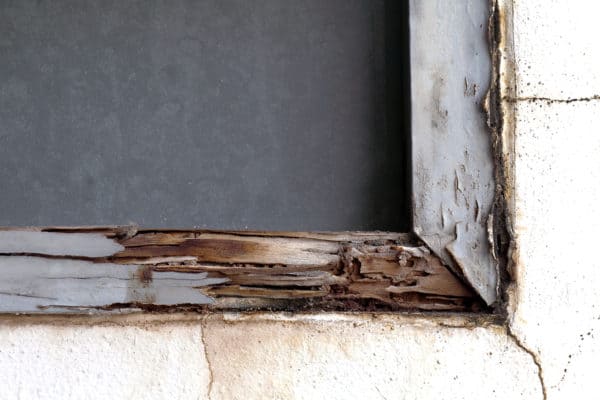
When it comes to protecting your home from termites, your best bet is not to rely on just luck – termite prevention is critical to minimizing or completely avoiding the costly destruction termites can cause to your home. In fact, some cultures consider termites in the home bad luck. These cultures see termites as an omen of death in the near future for the homeowner; the only way to escape this ill fate is to eliminate the termite colony or abandon the infested home.
If prevention fails, early detection is the next best thing. Termites can cause significant damage to your home while remaining undetected for years. For this reason, annual termite inspections can help identify these pests early, saving you from costly long-term damages.
Prevention is key. Here are a few tips for termite prevention in your home:
Termites will look for any way possible into your home in search of food. Try to reduce any soil to wood contact around your home by getting rid of any lumber, mulch, plants, or wood from your foundation. Try to also keep at least a 4 inch barrier between any mulch used in your landscaping and the side of your home. If possible, use pine straw instead of mulch as it is less appetizing for termites. Keep shrubbery trimmed back at least 12 inches from the walls of your home and get rid of any fallen branches, dead wood, or old tree stumps on your property.
Make sure your storm drains are directed away from the foundations and that they drain at least a few feet from foundations. Check for and repair any leaky faucets, pipes, or appliances and eliminate any other sources of excess moisture in your home. Keep sprinkler heads pointed away from foundations. If you have a crawlspace, consider crawlspace enclosure to not only help eliminate moisture under your home, but prevent mold, mildew, wood rot, and pests from getting into your home.
Most subterranean termites swarm during spring while drywood termites usually swarm in late summer and early fall. Be mindful of termite swarming season and make sure your outdoor lights are turned off at night. If possible, try to relocate any exterior lights to recessed areas away from doors and windows as swarmers are attracted to light.
Keep an eye out for signs of termites in your home. Discarded wings and evidence of frass are sure signs you have termite tenants. Other signs include blistering sheetrock, mud tunnels, cracks in your foundations, and a hollow sound when tapping on wood. Make sure the exterior of your home is well maintained to prevent these by inspecting and repairing wood siding and window frames.
Termites can be difficult to detect for long periods of time and even more difficult to get rid of once they are established. If you suspect you have a termite problem or if you want to get a step ahead of the prevention game, contact a professional pest control company who can set you up with annual termite inspections and, if necessary, a termite control plan.
Energy Saving for the Holidays
Should You Enclose Your Crawlspace in Winter?
Keeping Pests Away From Your Holiday Treats
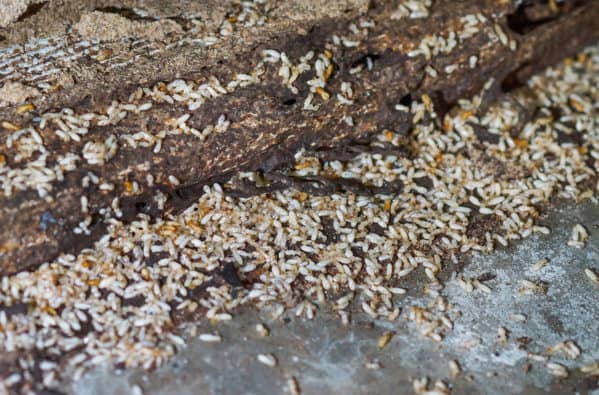
Termites cause billions of dollars in damage each year. Because they work from the inside out, infestations are often not found until significant damage has already been done. Spring marks the beginning of the termite swarming season and these destructive pests are found in most of the United States (except for Alaska). What do you need to know before swarming season starts to help control termites? Find out the answers to many of your termite questions below.
Termites swarm as the weather begins to warm, usually at the beginning of spring or summer and usually after a rain event. Termites swarm when they go in search of a location to establish a new colony. Colonies typically don’t produce a swarm until they have been established for at least 3 years.
If a swarm happens inside your home, most of them will not survive to establish a new colony but it does mean that your home is likely infested. If a swarm happens outside your home or if you notice just a few stragglers inside, your home is most likely not infested but a colony (or multiple colonies) are present nearby.
Swarming termites have one purpose – to reproduce and establish a new colony. In fact, they don’t have biting or chewing mouthparts to cause damage to your home. Several hundred swarmers are produced by each colony but only a small percentage of these actually survive to start the new colony.
Termites have straight antennae and wide bodies without pinched waists. They are usually black or dark brown in color. Swarming termites have wings that are the same length and clear in color. Termites are found in decaying stumps, trees, wood debris, lumber, and other wooden structures. They cause structural damage by eating wood and other cellulose-based products like paper.
Flying ants (also known as carpenter ants) have elbowed antennae and pinched waists. They can be black, brown or reddish in color. They have 2 pairs of wings that differ in size and are tinted brown in color. Carpenter ants also inhabit wood and wood structures; however, they don’t eat wood and therefore do not usually cause any structural damage. They do eat nectar, seeds, other insects, and food debris in and around your home.
Both termites and flying ants swarm as part of their mating process.
The main attractant to termites is food. Termites love to eat anything wood or cellulose-based including lumber, firewood, newspaper, and more. They also like warm, dark places that are undisturbed such as your crawlspace. They also thrive in moist soil, especially around your foundations.
While there are some do-it-yourself options you can do around your home, these are more suitable for termite prevention rather than termite control. Getting rid of termites is a job best left to the professionals. Some things you can do around your home to help prevent termites include:
There are two major types of termite treatment: liquids and baits.
Liquid termite treatments have been around for years. Their purpose is to provide a long-lasting barrier in the soil that keeps termites from entering and infesting buildings. This treatment also helps eliminate termites that are already inside structures as it prevents them from getting back to the soil for supplemental moisture.
Bait termite treatments use a cellulose-based food product combined with a slow acting pesticide. The bait stations are installed below the ground where termites eat the bait and share it with other termites in their colony. This leads to a gradual decline in the termite population infesting the structure.
If you suspect you have a termite problem, contact a professional termite control specialist. A thorough termite inspection by a trained pest control professional is critical in identifying and eliminating a termite infestation from your home.
Lawn Care: How to Keep Your Grass Green in the Summer
5 Ways To Prevent Bed Bugs When Traveling
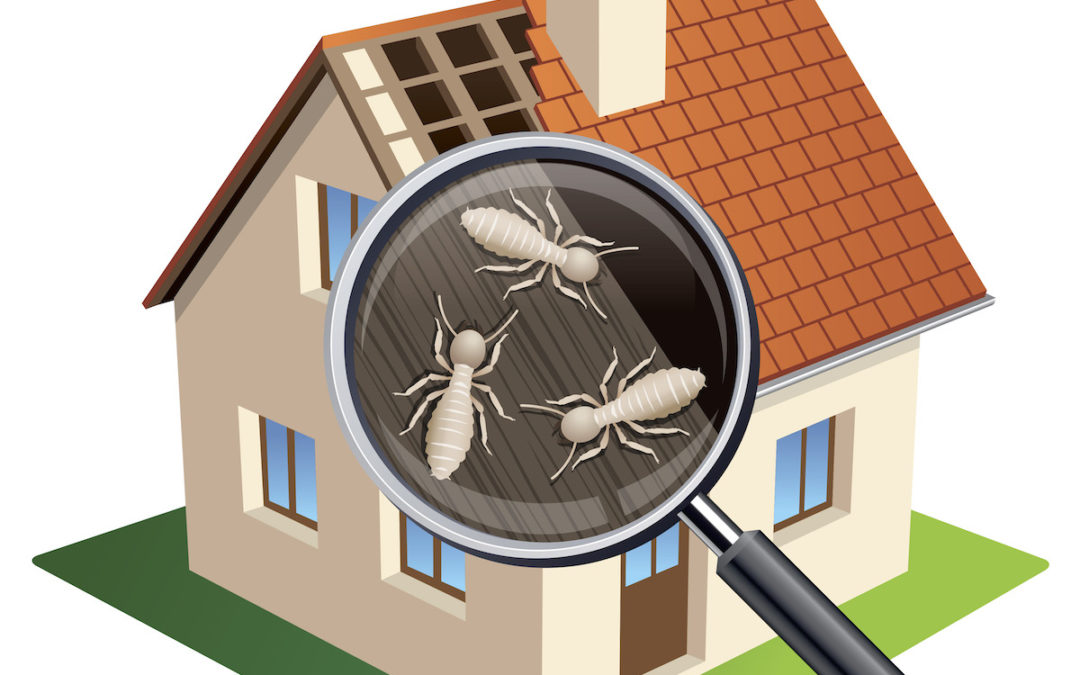
The 2 most common reasons to need a termite inspection: when required during real estate transactions and if termite activity is present or suspected by homeowners and business owners.
If either of these situations applies, you may be wondering how much a termite inspection costs, and what steps are taken if an infestation is found by a termite exterminator.
If you own a home or business and see signs of active termites (usually swarming termites) or termite damage, you’re going to need a termite inspection from a local exterminator near you. Or if you’re considering selling your home in the near future and don’t have a termite warranty, now may be a good time for a termite inspection, so you don’t delay the sales process when you find a potential buyer.
If the intent is to get termite treatment options and find out if you have an active termite infestation, most termite exterminators will perform a free termite inspection. The first step in this process is to contact a reputable pest control company and schedule a termite inspection. On the day of inspection, be prepared for the inspector to spend a half hour to an hour or longer at your property, depending on the size and condition of the home or business. The inspector will be looking for active and previous signs of termites, termite damage, and any other wood destroying insects or pest issues.
If termite activity is found, previous or active, termite treatment options will be provided. Common forms of treatments include liquid barrier treatments and termite baiting systems, which are a less invasive, environmentally responsible option. Most exterminating companies will also offer termite warranties with treatment so that your property is protected from future termite infestations and/or damage.
If no termite activity is found, it’s still a smart choice to consider having your home or business treated for termites. A baiting system like Sentricon Always Active® is a great preventative treatment choice. Termites cause billions of dollars in structural damage each year so taking a proactive approach to termite protection is the only way to totally protect your investment from termites.
Termite inspections and Wood Infestation Reports are usually required during the purchase of a home. These are NOT included in a general home inspection. Often, the real estate agent representing the seller will coordinate the termite inspection with their exterminating company of choice, if the homeowners do not currently have an active termite warranty. The fee for this inspection and report generally ranges from $45 to over $100 depending on the termite company. This fee is sometimes waived if active or previous termite activity is found and the property will require a termite treatment.
Termite Treatment Options: How Sentricon Works
Termite Control: Do I Really Need Termite Protection
What Are Your Termite Treatment Options?
Green Pest Control: Is it Worth the Investment?
What to Look for When Choosing an Exterminator
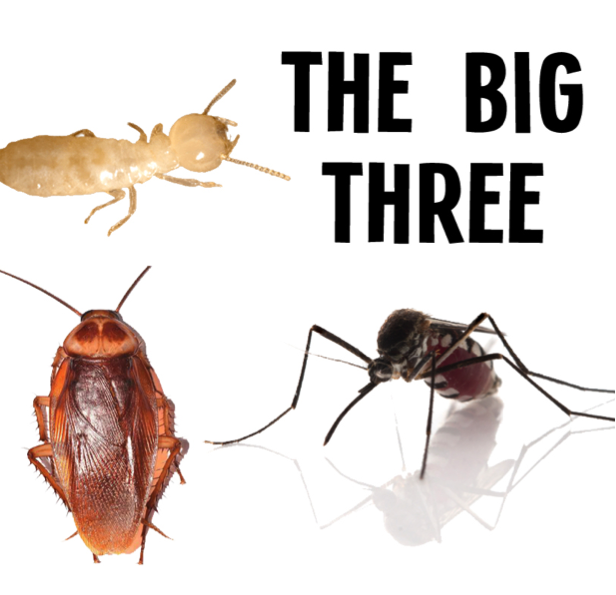
As we approach the warmer and more humid months, the chance of encountering pests increases. While some are more occasional invaders, there are some that will make it a point to stick around.
With the weather changing and a large amount of rain in the forecast, your home provides cockroaches with shelter and an ever-flowing food source. The larger roaches you may encounter are more than likely American cockroaches; an infestation that is normally easy to stop with a quarterly pest service. However, if you notice smaller roaches in the kitchen and/or bathroom of your home, you may be dealing with German cockroaches. They are a much harder infestation to control and will usually require a monthly treatment by your exterminator.
There is a consensus in the South that mosquitoes are despised, and we would all like them gone. Unfortunately, they seem to be here to stay, as they thrive in this area due to the humid climate. Also, because of where we are located, our mosquito season starts before other regions in the U.S. They are more of a hazard than just a casual annoyance; mosquito bites have the potential to spread diseases like Malaria, Dengue, and Zika. At Northwest, our Mosquito Reduction Service reduces adult mosquitoes and limits mosquito breeding around your home, reducing your risk of mosquito bites and mosquito diseases.
In the pest world, we refer to the warmer months as “swarm season.” This is when pests that have been overwintering emerge and begin to swarm. Termites only swarm once a year and, here in the South, the type you will see swarming are Subterranean termites. The ones you see flying around your home are not the ones that will cause destruction; however, it’s a sign that a termite colony is nearby. A termite inspection by a professional exterminator will not only look for signs of termite damage around your home but will also provide you with a personalized plan for treatment, if damage is found, and prevention moving forward.
Termite season is here! You may be seeing many ads for termite protection for your home, but you’ve gone years without termite protection. Is it even worth it?
Well, let’s look at the facts when it comes to termites and your home.
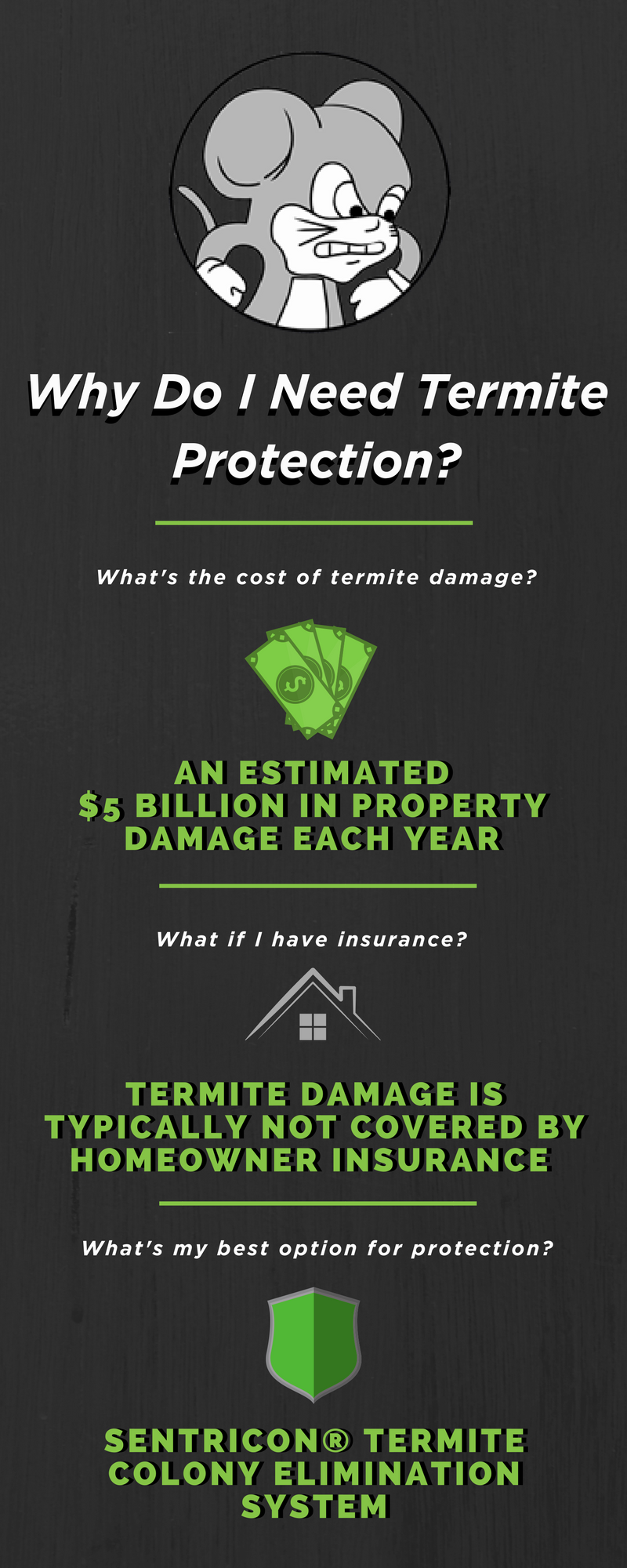
While you may not notice any signs of termite damage in your home currently, that doesn’t mean there’s not a silent, ongoing termite infestation causing damage to the structural integrity of your home. By having your home inspected, you may be able to catch the damage before it’s too late or prevent damage from ever impacting your largest investment.
When you sign up for Northwest Termite Service, here is what you can expect:
Don’t wait until you’re stuck with an insurmountable repair bill. Call (888) 466-7849 and set up a free termite inspection today!